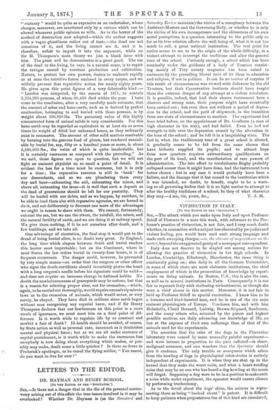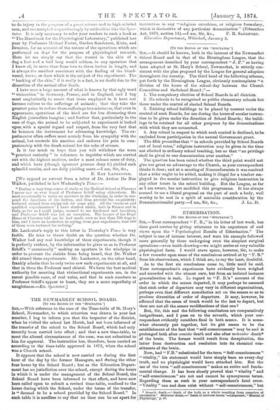VIVISECTION IN ITALY.
[TO TRH EDITOR OF THR .5P5OTLT3R.1 SIR,—The attack which you make upon Italy and upon Professor Schiff of Florence in a note this week, with reference to the Pro- fessor's practice of vivisection, is not fair, and I very much doubt whether, in connection with a subject less obscured by prejudice and violent feeling, you would have used such strong language and made such sweeping charges,—in the absence of any evidence on the matter, beyond the exaggerated gossip of a newspaper correspondent.
Italy does not deserve to be singled out among nations for allowing the practice of vivisection in her high schools. In London, Cambridge, Edinburgh, Manchester, the same thing is continually going on ; also daily in all the German Universities, in some of which there are moat elaborate institutions, the chief employment of which is the prosecution of knowledge by experi- ments on living animals. In Boston, U.S., this is also the case, as well as in several institutions in Paris. Consequently it is not fair to reproach Italy with sheltering vivisectionists, as though she were a chief sinner in this matter. Moreover, it is not fair to hold up Professor Schiff to special execration. I know him to be a humane and kind-hearted man, and he is one of the six most eminent physiologists of Europe. Condemn him, and with him Helmholtz, Claud Bernard, Ludwig, Brown-Sequard, Sanderson, and the many others who, actuated by the purest and highest possible motives, are daily advancing our knowledge of life, no less at the expense of their own sufferings than of that of the animals used for the experiments.
The assertion that the cries of the dogs in the Florentine laboratory were caused by some unusually painful experiment— and were intense in proportion to the pain inflicted—is sheer, malignant nonsense, and one wonders that the Spectator should give it credence. The only trouble or annoyance which arises from the howling of dogs in physiological laboratories is entirely independent of experiments. It is when they are shut up in the kennel that they make the worst noise, and what a heart-rending noise that may be no one who has heard a dog howling at the moon will forget. Supposing a dog were to be in a position to make such a noise while under experiment, the operator would ensure silence by performing tracheotomy.
As to the detail about the dogs' skins, the animus in repre- senting them as being "hacked about" is patent. It is difficult to keep patience when preposterous lies of this kind are circulated,
to do injury to the progress of a great science and to high-minded men, and are accepted ubquestioningly by authorities like the Spec- tator. It is only necessary to refer your readers to such a book as "The Handbook for the Physiological Laboratory," published last
year by Professors Michael Foster, Burdon Sanderson, Klein, and Brunton, for an account of the nature of the operations which are performed on dogs for the purpose of physiological research.
Here let me simply say that the wound in the skin of a dog a foot and a half long would seldom, in any operation that I know of, be more than from two to three inches in length, and is always the smallest consistent with the finding of the blood- vessel, nerve, or duct which is the subject of the experiment. The "hacking of the skin," if it really is a fact, is no doubt due to the dissection of the animal after death.
I have seen a large amount of what is known by that ugly word "vivisection" in Germany, France, and in England, and I beg most emphatically to assert that those employed in it have not become callous to the sufferings of animals; that they take the greatest pains to reduce those sufferings to a minimum, that even in appearance, operations of the kind are far less distressing than English journalists imagine ; and further that, particularly in the ease of dogs, the animal to be subjected to experiment ii looked upon with a special regard and respect, from the very fact that he becomes the instrument for advancing knowledge. The ex- perimenter often suffers most acutely from his sympathy with the animal, but controls his emotion and endures his pain in com- panionship with the dumb animal for the sake of science.
Is it too much to hope that you will withdraw the term *prurient curiosity" in reference to inquiries which are carried out with the highest motives, under a most solemn sense of duty, and which have (though ignorant persons deny it) yielded such splendid results, and are daily yielding more.—I am, Sir, Sic., E. RAY LANKESTER. [We append an extract from a letter of Dr. Arthur De Noe Walker, published in last Wednesday's Times :—
"During a very long course of study at the Medical School at Florence I never saw or ever heard of Professor Schiff using chloroform. He used occasionally to make an aperture in the windpipe, in order to sus- pend the functions of the larynx, and thus prevent the exquisitely- tortured animal from crying out for some pity. All the 'eminent and qualified experimenters' I have studied under, both in France and in Italy, as far as I could judge, seemed to me hardened and heartless, and Professor Schiff was not an exception. The keeper of the Dogs' Home at Florence told me be had made over no less than 700 dogs to him, and I have no hesitation in saying, from past experience, that 680 of them were tortured for nothing."
Mr. Lankester's reply to this letter in Thursday's Times is very feeble. He tries to throw doubt on the question whether Dr.
Walker had any real knowledge of these experiments, though it Is perfectly evident, by the information he gives us as to Professor Schiff's " occasionally " making an aperture in the windpipe in
order to prevent the shrieks from being heard, that Dr. Walker did attend these experiments. Mr. Lankester, on the other hand, frankly admits that he only twice saw such experiments at all, and
that in these the Professor used chloral. We have the best medical authority for asserting that vivisectional experiments are, in the rarest possible cases, of real value, and that in such numbers as Professor Schiff's appear to boast, they are a mere superfluity of naughtiness.—En. Spectator.]











































 Previous page
Previous page